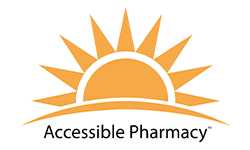At Accessible Pharmacy Services, we understand the challenges of living with diabetes and part of the blind and low vision community. We have professionals on staff who are experts in all facets of diabetes and they deeply understand the unique needs of patients in our community.
Diabetes is difficult to manage, but it’s not something that you have to do alone. There are a number of factors to consider:
- Diet and nutrition
- Exercise
- Medications
- Glucose testing
- And more
For some, insulin injections become a part of daily living.
We can support you in your journey and provide assistance with training and education, while packaging your medications in the manner that best suits your individual needs. We will interact with your doctors regularly to make sure that you always have refills on your medications.
We can help with testing and injections by accessing us through the Be My Eyes App or you can simply call us. We can even help you pick your insurance if you’re on Medicare D.
People can be born with diabetes or can develop it later in life. Diabetic Retinopathy is a diabetes complication that affects your eyes. It’s caused by damage to the blood vessels of the light-sensitive tissue at the back of the eye (the retina). At first, diabetic retinopathy may cause no symptoms or only mild vision problems. Eventually, it can cause blindness. The condition can develop in anyone who has type 1 or type 2 diabetes. The longer you have diabetes and the less controlled your blood sugar is, the more likely you are to develop this eye complication. To read more about diabetic retinopathy, go to: Diabetic Retinopathy
The most important thing to realize is that no two people have the same experience or needs with diabetes. We are sensitive to this and have resources available to address almost any issue that you may have. We also understand that and individuals circumstances change through time and their needs change as well. We are dedicated to ensuring accessibility and providing the highest level of service to our clients.
Below is some great information from our friends at the AFB titled: A Guide to Living with Diabetes and Vision Loss.
This guide has three important sections:
- The Basics About Living with Diabeteswith seven lessons in audio with transcripts that give you the “basics” about living with diabetes. The seven lessons follow the American Association of Diabetes Educators (AADE) Self Care Behavior format.
- A Guide to Caring for Yourself When You Have Diabetes and Vision Loss. It follows the AADE step-by-step lesson format in an audio version and print.
- The third section is a Spanish translation of the guide to caring for yourself when you have vision loss in audio and print.
Diabetes care is almost entirely managed by the person who has it. If you’ve lived with diabetes for any length of time, then you know there is no negotiating its demands. Day after day, you alone determine when and what to eat and how much to exercise. It is up to you to remember when to take your medication, how often to check your blood glucose level, and what to do if your blood sugar levels are too high or too low.
Successful management of diabetes—even under the most ideal circumstances—requires great discipline, not to mention specific knowledge, skills, and tools for self-care. When vision loss enters the picture—as it frequently does as the disease advances—there’s yet another level of complication and risk added to your treatment regimen.
Perhaps you are one of the 3.2 million Americans now living with both conditions—an occurrence that will grow even more common as the nation’s retirement-aged population increases. If so, then be sure to check out the resources on VisionAware, which helps adults who are losing their sight continue to live full and independent lives by providing timely information, step-by-step daily living techniques, a directory of national and local services, and a supportive online community.
You can find this information and more on the American Foundation for the Blind website at: https://www.afb.org/blindness-and-low-vision/eye-conditions/diabetes-and-vision-loss.
If you are living with diabetes, vision loss, or both, please do not hesitate to give us a call and find out if we are the right fit for your health needs. Our phone number is 1-888-633-7007.
